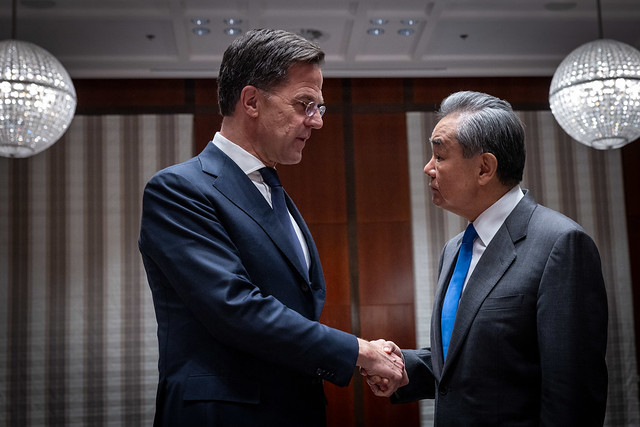風蕭蕭_Frank
以文會友唐納德·特朗普的強勢外交政策為中國帶來機遇
作者:馬修·萊維特,2025年3月7日
https://www.americansecurityproject.org/donald-trumps-aggressive-foreign-policy-presents-an-opportunity-for-china/
唐納德·特朗普的強勢外交政策為中國帶來機遇 北約秘書長馬克·呂特與中國外交部長王毅在慕尼黑安全會議上合影。北約
特朗普第二屆政府在外交政策上的大刀闊斧的改革,迄今為止已疏遠了其歐洲盟友,瓦解了美國國際開發署這一美國軟實力的主要來源,並惡化了與美國在拉丁美洲最強大的盟友之一哥倫比亞的關係。唐納德·特朗普的“鐵腕”外交政策正在動搖世界秩序,但美國外交政策的這種鮮明對比並沒有像他所預測的那樣,對世界各國領導人產生影響。相反,它導致美國在安全和經濟領域陷入孤立,並鼓勵中國加強與美國盟友的關係。
特朗普的“美國優先”外交政策方針,雖然對美國的盟友和夥伴來說並不新鮮,但其帶有新的攻擊性,使他們對與美國關係的未來產生了疑問。友好國家正在重新考慮與美國的外交、安全和經濟聯係,而中國正利用這種混亂局麵推進與這些國家的關係。隨著美國完成解散美國國際開發署並停止數百億美元用於支持人道主義項目的對外援助,中國繼續在發達國家和發展中國家投資數千億美元,構建其勢力範圍。
副總統J.D.萬斯在慕尼黑會議上對歐洲盟友的批評,恰逢美國和俄羅斯就恢複外交關係正常化和結束烏克蘭戰爭展開新的談判——盡管沒有烏克蘭或歐洲官員參與其中。針對萬斯的言論和利雅得會晤,即將上任的德國新總理弗裏德裏希·梅爾茨表達了“脫離美國獨立”的願望。自利雅得會晤以來,特朗普因與澤連斯基在橢圓形辦公室的爭吵而停止了對烏克蘭的所有援助,這促使歐洲領導人努力達成一項不包括美國的和平協議和安全領域。就連歐洲各地的民粹主義保守派領導人也開始與特朗普劃清界限。
盡管特朗普政府違背了歐洲盟友的意願,但中國外交部長王毅卻站在他們一邊,支持“歐洲在和平談判中發揮重要作用”。隨著美國與其北約盟友之間的緊張關係加劇,歐洲人應該在進一步內部化國防工業之前,考慮一下他們能夠容忍多少美國的好戰行為。2022年中期至2023年中期,歐盟國家63%的軍事采購支出流向了美國國防公司,但現在,歐盟……製定了一項緊急國防支出計劃,這將大幅增加歐洲的國防開支,如果其國防采購和生產能力增強,可能會進一步內化。如果美國維持目前在歐洲的立場,不僅會損害其在世界舞台上的地位和吸引合作的能力,還會發現自己脫離了幾十年來發展和維持的安全圈。
除了華盛頓新的外交策略外,美國的經濟政策也未能說服世界各國領導人將美國視為可靠的盟友。由於過去十年美國曆屆政府的外交和經濟政策發生了劇烈變化,歐洲國家正在重新評估這種大規模合作帶來的風險。特朗普提出對一係列歐洲商品征收25%的關稅,歐盟已宣布將“堅決且立即作出反應”。如今,歐洲與中國的關係開始解凍,因為在美國關稅的持續威脅下,中國目前是更可預測的貿易夥伴。
但特朗普政府攪動的不僅僅是歐洲的國際關係。特朗普第二任期內首件引人注目的外交政策事件是,哥倫比亞總統古斯塔沃·佩特羅以“缺乏人類尊嚴”為由拒絕接受一架載有被驅逐移民的軍用貨機,導致所有哥倫比亞商品被征收25%的關稅。盡管佩特羅最終迫於壓力作出讓步,但這一事件向美國盟友傳遞了特朗普強硬外交政策死灰複燃的信號。自此以後,哥倫比亞——2023年美國對外援助第14大接受國,也是華盛頓在拉丁美洲曆史上最強大的盟友之一——加速了其長達數月的經濟脫鉤進程。目前,哥倫比亞正在敲定加入中國“一帶一路”倡議的計劃,同時也在尋求加入金磚國家,並可能與中國達成自由貿易協定。
如果美國繼續推行這種敵對外交政策,它將我失去盟友的速度比留住或吸引盟友的速度要快。雖然在巴拿馬等個別情況下,這種策略可能有效,但不應成為標準。在一個日益多極化的世界裏,盟友是最重要的資產,中國樂於與美國盟友發展夥伴關係,而不必像唐納德·特朗普那樣公開譴責。
Donald Trump’s Aggressive Foreign Policy Presents an Opportunity for China
 NATO Secretary General Mark Rutte with the Minister of Foreign Affairs of China, Wang Yi, at the Munich Security Conference. NATO
NATO Secretary General Mark Rutte with the Minister of Foreign Affairs of China, Wang Yi, at the Munich Security Conference. NATOThe second Trump administration’s drastic change in foreign policy has, so far, alienated its European allies, dismantled a major source of American soft power in USAID, and soured relations with Colombia, one of the U.S.’ strongest allies in Latin America. Donald Trump’s “iron-fist” approach to foreign policy is shaking the world order, but this stark contrast in U.S. foreign policy is not whipping world leaders into shape as he predicted. Instead, it is ushering in U.S. isolation in security and economic spheres, and encouraging greater Chinese relations with U.S. allies.
Trump’s “America First” approach to foreign policy, while not new to U.S. allies and partners, comes with a renewed aggressiveness that leaves them questioning the future of their relationship with the United States. Friendly nations are now reconsidering their diplomatic, security, and economic coupling with the United States, and China is taking advantage of the chaos to advance relations with them. As the U.S. completes the dissolution of USAID and the cessation of tens of billions of dollars of foreign aid supporting humanitarian programs, China continues investing hundreds of billions of dollars across the developed and the developing world, building its sphere of influence.
Vice President JD Vance’s criticisms of European allies in Munich coincided with new negotiations between the United States and Russia about the re-normalization of diplomatic relations and ending the war in Ukraine—though no Ukrainian or European officials were involved. In response to Vance’s comments and the Riyadh meeting, new expected German Chancellor, Friedrich Merz, expressed his desire to “achieve independence from the U.S.” Since Riyadh, Trump has ceased all aid to Ukraine in response to his argument with Zelenskyy in the Oval Office, prompting European leaders to work towards a peace deal and security sphere that does not include the United States. Even populist conservative leaders across Europe are distancing themselves from Trump.
While the Trump administration defied the wishes of its European allies, Chinese Foreign Minister Wang Yi sided with them, supporting “Europe’s important role in the peace talks.” As tensions between the United States and its NATO allies rise, the Europeans should consider how much American belligerence they can tolerate before greater internalizing their defense industry. Between mid-2022 and mid-2023, 63% of E.U. countries’ military procurement spending went to U.S. defense companies, but now, the E.U. has laid out an emergency defense spending plan that will significantly boost European defense spending and likely internalize more if its defense procurement and production. If the United States maintains its current stance in Europe, it will not only hurt its position on the world stage and its ability to attract cooperation, but it will also find itself outside of a sphere of security it has grown and maintained for decades.
In addition to Washington’s new diplomatic approach, American economic policy is not convincing world leaders to see the United States as a reliable ally. Due to drastic shifts in U.S. foreign and economic policy across administrations this past decade, European nations are reevaluating the risks associated with such significant coupling. Trump floated imposing 25 percent tariffs on an assortment of European goods, to which the E.U. has announced it would “react firmly and immediately.” Now, Europe has begun thawing relations with China, because under constant threats of U.S. tariffs, China is currently the more predictable trading partner.
But the Trump administration has not just stirred international relations in Europe. The first headline foreign policy event of Trump’s second term saw 25 percent tariffs on all Colombian goods due to President Gustavo Petro’s refusal to accept a military cargo plane of deported immigrants on the grounds it lacked human “dignity”. While Petro ultimately backed down due to pressure, the incident sent the message of Trump’s revived strongarm foreign policy to American allies. Since then, Colombia, the 14th largest recipient of U.S. foreign aid in 2023 and one of Washington’s strongest historical allies in Latin America, has accelerated its months-long process of economic decoupling from the United States. Now, Colombia is finalizing plans to join China’s Belt and Road Initiative while also seeking to join BRICS and potentially enter a free-trade agreement with China.
If the United States keeps pushing this hostile foreign policy, it will lose allies quicker than it can retain or attract them. While it may prove effective in isolated cases, such as Panama, this strategy should not become the standard. In an increasingly multipolar world where allies are the greatest asset, China is glad to develop partnerships with U.S. allies that do not involve the public admonishment that comes with Donald Trump.




